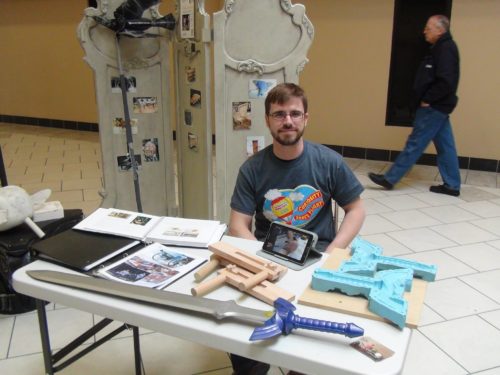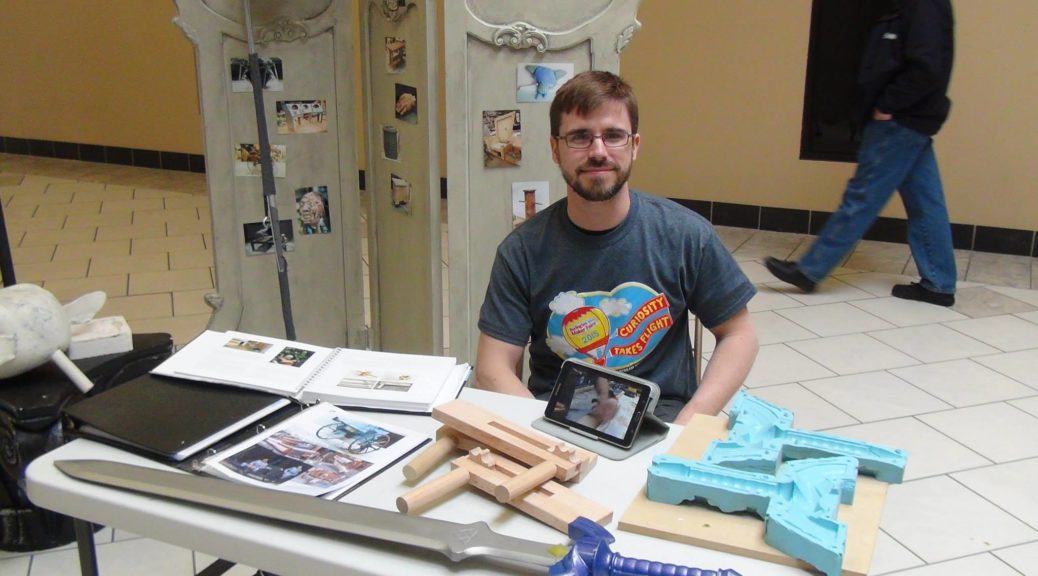I receive a number of inquiries every month from strangers who found my work and want me to build a prop. They range from churches who put on small performances, to magicians who want to make their show more exciting, to cosplayers who want a fake weapon. Sometimes, people just need some weird, custom item built that does not fit any other craft or discipline.
I can usually tell from their first email whether I want to do business with them. If you are looking to hire a prop maker, here are a few tips and tricks to make sure they respond back.
Tell me what you want.
I will occasionally find an email that simply says, “I may have a project for you. Give me a call.” In my world, a “project” can mean anything from making a fake thumb to carving a Mount Rushmore parade float. I need some sense of the scope and scale of the project at the beginning, as well the general topic. You do not need to have all the details worked out, just a brief description. If you need a chair shaped like a mushroom, great, let us talk more. If you need an 18th century ballroom gown, I have no idea how to make that, and it is a waste of both of our times to discuss anything else before you reveal what the project actually is.
You don’t need to have any knowledge about specific materials or construction methods. You just need to give me the circumstances: will it be used outside? Does it need to fit in your car? Will children handle it? How heavy can it be?
Know your budget.
If you have something very specific to build, then I can come up with a bid of what it will cost. But if you are open, then I can come up with a range of solutions to fit most any budget. I can do a $3000 severed head, I can do a $300 severed head, and I can do many other options in between. And on a side note…
It may cost more than you anticipate.
I find it much easier to deal with businesses and companies in the entertainment industry, because they are used to dealing with prop builders and fabrication shops, and know how much these things cost. When I quote them a price, it is in line with what they have spent on similar things in the past. When I deal with individuals outside the industry who have never hired a prop builder before, the costs can be shocking. They see a cheap plastic sword on Amazon for $39 and think a custom-fabricated version will cost the same.
If I am contacted by a stranger who is not local, it is not even worth my time to consider projects less than a couple hundred dollars. Once you subtract materials and supplies, I can barely cover the cost of babysitting to spend time in my shop. Why would I want to spend my nights working on someone else’s project when I could be playing with my kids?
Give me a deadline.
Prop builders are busy folks, and they cannot just drop everything to start work on your project. If you have a specific timeline to complete the project, it becomes easier for the prop builder to carve time into their schedule. The shorter your timeline, the more expensive the project will be. I can do almost anything for the right price.
Also, be realistic about your deadlines. If you live in Seattle and you contact me, a North Carolina prop builder, for something you need in a week, it won’t happen. First, it may take a day or two just to hash out the details over email and commit to the project. Second, it will take a few days just to ship it there. That leaves almost zero time for the project itself, which may require materials to be ordered and paint to dry, not to mention I am already working on multiple projects at any given time.
Do your research.
If you really want a prop built, you should be contacting more than one prop builder. It is far easier to work with someone locally who you could visit in person, or at least pick the prop up personally. Chances are, there is one nearby. Look up local theaters and see if they list the prop department on their website. Not all prop builders have their information online, so it may take a few emails asking around before you get a name and contact information.
When you do find a prop builder, make sure your project is in line with other projects they have done. A prop builder who makes rubber ducks can probably make a rubber goose for you. However, a prop builder who fabricates medieval armor may not have the tools or skills to make that same rubber goose.
The best way to find prop builders is by asking other prop builders. If you contact one who cannot build your prop, ask them if they know anyone else who might be interested. We love referring jobs to other props people we know.
What are your thoughts?
Do any other prop builders out there have advice for people contacting them? Let me know!



